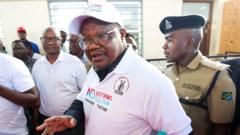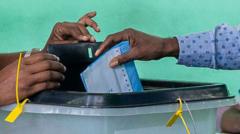Canada is set to hold its federal election on April 28, with the Liberal Party under new leader Mark Carney facing off against the opposition Conservatives led by Pierre Poilievre. This article outlines voter eligibility, the voting process, and what Canadians can expect on election day.
Canadians Prepare for April 28 Election: Key Facts and Voting Process

Canadians Prepare for April 28 Election: Key Facts and Voting Process
A detailed overview of the electoral process as Canada approaches its federal election, highlighting key players and voting mechanics.
As Canada gears up for its federal election on April 28, voters will have an important decision to make about who will lead the country: the incumbent Liberal Party, currently helmed by Mark Carney, or the Conservative Party under Pierre Poilievre, aiming to regain control after nearly a decade in opposition. With the stakes high, here's what citizens need to know about the voting process and the election mechanics.
Eligibility to vote in Canada extends to all citizens, including those incarcerated and expatriates; however, the chief electoral officer must abstain from voting during their term, as must the governor general to maintain political neutrality.
The main task for voters is to elect their local representative in the House of Commons, with the upcoming parliamentary assembly consisting of 342 members—a four-seat increase due to population growth. Canada employs a "first past the post" electoral system, whereby the candidate with the most votes wins, regardless of whether that candidate secures a majority of the ballots cast. Notably, there will be no votes on referendums or for other offices in this election.
To ensure a smooth voting experience, most Canadians have received a polling card in the mail noting their designated polling locations and details about the advanced voting days, which commence this Friday. For any citizens who encounter issues with their cards or have not received them, Elections Canada provides an online resource to address these concerns, ensuring that every eligible voter has access to participate in shaping the future of their government.




















